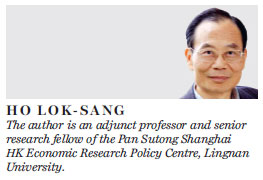Open minds keep HK competitive
Updated: 2016-04-12 07:36
By Ho Lok-sang(HK Edition)
|
|||||||
Ho Lok-sang is worried that the city is becoming more parochial and insular and warns that this does not bode well for its future as a global financial center
The latest Global Financial Centres Index (GFCI) ranking, just announced, showed that Hong Kong has for the first time in many years been overtaken by Singapore, having fallen to fourth place. Hong Kong's score dropped slightly, by only one point, to 753, while Singapore's rose by five points to 755. While the extent to which Hong Kong has fallen behind Singapore may be tiny, its future as a global financial center is truly worrying.
A question in the survey asked respondents whether they expected each financial center to gain in importance in the future. Singapore was right at the top, followed closely by Shanghai. These two cities were mentioned 121 and 120 times, respectively, as being likely to gain in importance. Hong Kong got a pitiful 55 mentions.
The GFCI survey assesses the strength of a financial center under five categories of criteria - Business Environment, Financial Sector Development, Infrastructure Factors, Human Capital, and Reputation and General Factors. Under each heading are four sub-categories of criteria. So many dimensions of strength are surveyed that it may be difficult to name a factor among those listed as the most important one. But there is indeed one factor which is of overriding importance.
Many people might think that this is the rule of law. Hong Kong's rule of law is highly rated: According to the World Justice Project 2015 survey, Hong Kong has a better rating than the US, where New York City is located and New York is ranked second on the GFCI. This shows that while a strong rule of law is important and certainly necessary, it is not sufficient to keep a financial center at the top.
The factor that I would like to highlight is not listed in the GFCI survey. Yet it is of overriding importance and has a strong effect on all the five major categories of strengths assessed. This is an "Open Mind Ready to Learn from Others and to Improve Oneself". With such an open mind and humility, the legal system and political institutions will evolve for the better. The business environment, infrastructure, human capital and reputation will all keep improving. Unfortunately, it does seem that we have been losing our shine in this regard over the years. I have seen too many people who keep saying that what we have now is the best, as if there is no room for improvement.
We also seem to have become more parochial or insular, fearing competition from strong contenders. More and more people seek measures that effectively discriminate against foreigners and mainland people under the guise of "localism", and the SAR government has responded. The Buyers' Stamp Duty (BSD) is a case in point. I cannot understand how a global financial center could regard expatriates who work and live here as "not one of us" and therefore must pay a punishing BSD should they want to buy a flat. The hostility of some Hong Kong people to mainland tourists has contributed to a sharp decline in the number of mainland tourists and undermined our business environment.
With a resurgent pride in our local heritage, we seem to be losing our pragmatic side. Instead of trying to improve our English and Putonghua to achieve better communication with people around the world, more and more of us have lost motivation to learn. We have become self-congratulatory because our mother tongue is the very colorful Cantonese and because Cantonese has a longer history than Putonghua. To some of us, there is therefore little need to improve our language skills in English or Putonghua. Some of us, particularly among the young, have grown unfriendly and even hostile to mainland people. One young man, a member of Civic Passion, even tried to persuade his friends on Facebook to destroy public library books which are published in simplified Chinese characters, and offered a guide to doing this.
Led by two professors and one church minister, the uncivil "civil disobedience" of the "Occupy Central" movement has left behind it a scene that is worrying. More and more people think that they can violate laws at will, as long as they think they have a cause. The movement has contributed to a sharp decline in Hong Kong's ranking in the Most Livable Cities Index, which was directly attributed to the movement.
A global financial center that has a future must be one that young people feel that they not only have a stake in but also that they will take over important roles and help run it sometime in the future. Leaders in the financial industry as well as the government should help our young people develop their potential as future leaders in the financial center. But then our youth must rekindle a strong motivation to learn. They must be globally minded, down to earth, and ready to take on challenges in civil and civilized ways. Are our young people ready to take on the challenge?

(HK Edition 04/12/2016 page9)